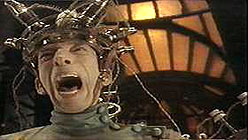|
|
|
|
The
City of Lost Children
|
 |
|
No matter what anyone thought of Delicatessen (1991), the previous film directed by Jean-Pierre Jeunet and Marc Caro, one particular sequence from it has well and truly entered movie lore. It is the outrageous, superbly orchestrated scene in which a couple make love on a noisy spring bed. As their rhythm increases, the activity of every other inhabitant in the building (all of whom can hear the lovers) takes on the same speed and intensity. Painting, cello playing, carpentry: all gestures are woven into the one, great, cosmic copulation – and they all come at the same moment. This set-piece amply demonstrated Jeunet and Caro's taste for the elaborate, burlesque gags of silent, comic cinema – updated, of course, to suit the more liberated tastes of today's graphic-novel (i.e. adult comics) connoisseurs. But it also revealed their affinity with a particular impulse in Surrealist art and philosophy: the idea that everything which occurs in both the natural and supernatural realms hums in synchronicity – and that our reality is the sum of such communicating vessels (as André Breton called them). Jeunet and Caro love inventing fantasy worlds in which all people and places are interconnected, as in some vast, grungey machine. The City of Lost Children creates a universe even more fanciful and labyrinthine than that of Delicatessen. Surer this time of their cinematic craft, and with greater resources at their disposal, Jeunet and Caro have conjured a splendid dream. The plot has many branches. There is a mournful, ugly old man named Krank (Daniel Emilfork) who captures children in the hope of extracting their dreams. There is a band of terrorist children led by the magnificent Miette (Judith Vittet). There is the strong-man One (Ron Perlman), in search of his lost, little brother. And there is an endless, freaky procession of genetic mutations, hired killers and solitary visionaries . The film is a seamless patchwork of filmic memories and models, the breadth of which will delight any true cinephile. The baroque decor and busy visual style recall Orson Welles and Terry Gilliam. Angelo Badalamenti's lush score evokes David Lynch's dark fantastications. Uniquely surrealist movies less well known to the casual filmgoer, such as Walerian Borowczyk's Goto, Island of Love (1969) and Raúl Ruiz's Three Crowns of the Sailor (1983), are equally key influences. And the weirdest Hollywood movie ever made for kids, The 5,000 Fingers of Dr T (1953), is never very far away. The most disarming and wondrous aspect of The City of Lost Children is its central love story – this delicate, platonic romance between a small girl and a large, adult man. They certainly make a charmingly odd couple: Miette, the sultry, dark, prepubescent vamp, and One, a dim, reckless, violent hulk. It sounds perverse, but it isn't. Although we are primed to believe, these days, that every expression of amour fou in surrealist art is monstrously libidinal, this film reminds us of a more fragrant, innocent dimension to such magical fantasy. This, too, evokes in a film buff's mind a precious store of such platonic, mismatched romances in cinema history, from Shirley Temple and Gary Cooper in Now and Forever (1934) to Gena Rowlands and her little Puerto Rican companion in Gloria (1980) via the forgotten arthouse weepie, Sundays and Cybele (1962). There is, of course, a thrill of the illicit – of the unspoken and ever-possible – in these stories. But, as with Lewis Carroll's legendary love for the real Alice who inspired his literary masterpieces, there is more than a grubby, repressed desire at work here. In fact, the emotional charge of these impossible loves in art and fiction is almost transcendental – somehow purer and more intense than normal love affairs. Jeunet and Caro's exhilarating and enthralling film-fantasy reminds us that, even in our frightfully materialist age, there are still some intoxicating mysteries which can instantly make children of us all. MORE Jeunet: Amélie © Adrian Martin December 1995 |
![]()